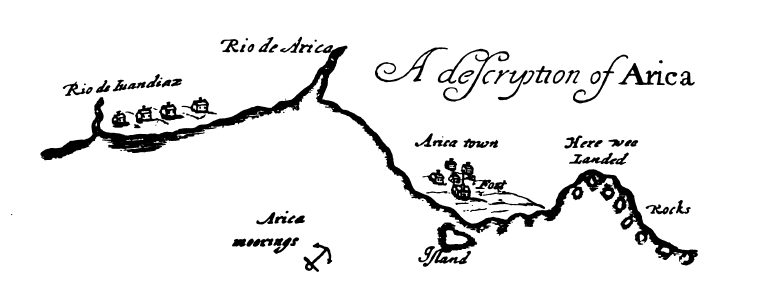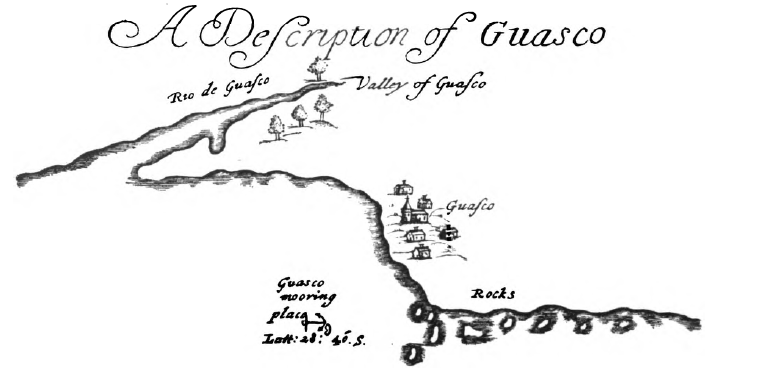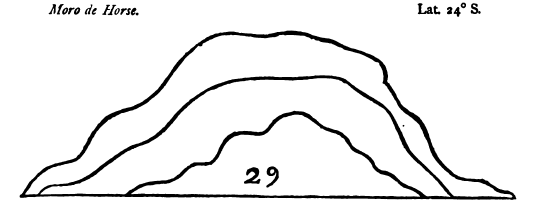| Web and Book design,
Copyright, Kellscraft Studio 1999-2016 (Return to Web Text-ures) |
 (HOME)
|
| CHAPTER XVII. A description of the Bay of Arica. They sail hence to the Port of Guasco, where they get provisions. A draft of the said port. They land again at Hilo to revenge the former affronts, and take what they could find.
HAVING
ended our attempt at Arica, the next day, being January the last, we
plied to and fro in sight of the port, to see if they would send out
the three ships we had seen in the harbour to fight us. For upon them
we hoped to revenge the defeat and disappointment we had received at
the town the day before. But our expectations in this point also were
frustrated, for not one of those vessels offered to stir.  The houses of this town of Arica are not above eleven feet high, being built of earth, and not of brick or timber. The town itself is four-square in figure, and at one corner stands the Castle, which may easily be commanded even with small arms from the hill which lies close to it. This place is the Embarcadero, or port town of all the mineral towns that lie hereabouts, and hence is fetched all the plate that is carried to Lima, the head city of Peru. I took the bay of Arica as it appeared to me. On Tuesday, February 1st, we had a clear observation, and by it we found lat. 19° 06' S. This day we shared the old remains of our plate, taken in some of our former booties. Our shares amounted only to thirty-seven pieces of eight to each man. N. B. — Here I would have my reader take notice that from this day forward I kept no constant Diary or Journal, as I had done before, at least for some considerable space of time, as you see hereafter; my disease and sickness at sea being the occasion of intermitting what I had never failed to do in all the course of this voyage till now. Only some few memorandums, as my weakness gave leave, I now and then committed to paper, which I shall give you as I find them, towards a continuance of this history. Thus: — Monday, February 14th. This night between eleven and twelve o'clock died on board our ship William Cook, who was the servant afore-mentioned to Captain Edmund Cook, of whom likewise mention has been often made in this Journal. February 16th, 1680. This day we found ourselves to be in lat. 27° 30' S. We had a constant breeze at S.E. and S.S.E. till we got about two hundred leagues from land. Then, at the eclipse of the moon, we had a calm for two or three days; and then a breeze at N. for the space of two days; after which we had a calm again for two or three days more. March 1st. By observation, lat. 34° 01' S. At this time begins the dirty weather in these seas. We lay under a pair of courses, the wind being at S.E. and E.S.E. with a very great sea at S.S.E. March 3rd. All hands were called up, and a council held; wherein considering it was now dirty weather and late in the year, we bore up the helm and resolved to go to the main for water, and thence to leeward, and so march overland towards home, or at least to the North Sea. But God directed us from following this resolution, as you shall hear hereafter. We being thus determined that day, we stood N.E. with a strong wind at S.E. and E. S. E. On March 5th died our Coquimbo Indian. The seventh we had a West-wind, our course being E. by N. The eighth of the said month we were put to an allowance, having only one cake of bread a day. March loth, we had a strong South-wind. On
March 12th we fell in with the main-land, somewhat to leeward of
Coquimbo. Within the island of Paxaros are double lands, in whose
valleys are fires for the melting of copper, with which metal these
hills abound. Off to sea-board it is a rocky land, and within it is
sandy. About the distance of eight leagues to leeward is a rocky point
with several keys or rocks about it. About one half mile to leeward of
this point turns in the port of Guasco. Right against the anchoring are
three rocks, close under the shore.  Being arrived here, we landed on shore threescore men of our company, with design to get provisions, and anything else that we could purchase. The people of the country all ran away as soon as they saw us. There was building on shore in this port a fire bark of sixteen or eighteen tons burden, with a cock-boat belonging to it. We took one Indian prisoner, and with him went up the space of six or seven miles into the country to an Indian town of threescore or fourscore houses. Thence we came back to the church, which is distant four miles from the seaside, and lodged there all night. Here are multitudes of good sheep and goats in the country adjoining this port, and it is watered with an excellent fresh-water river; but the getting of the water is very difficult, the banks being very high or otherwise inaccessible. However, we made a shift to get in five hundred jars of water. Furthermore, we brought away one hundred and twenty sheep and fourscore goats, with which stock we victualled our vessel for a while. As for oxen, they had driven them away farther up into the country. The jurisdiction of Guasco itself is governed by a Tenente, or Deputy-Governor and a Friar, and is in subjection to the city of La Serena above-mentioned, being a dependence upon it. Here grows corn, peas, beans and several other sorts of grain; and for fruits this place is not inferior to Coquimbo. Here we found likewise a mill to grind corn, and about two hundred bushels thereof ready ground; which we conveyed on board our ship. Every house of any account has branches of water running through its yards or courts. The inhabitants had hidden their wine and other best things, as plate and jewels, having descried us at sea before our landing: so that our booty here, besides provisions, was inconsiderable. However, we caught some few fowls, and eat five or six sheep and likewise a great hog, which tasted very like our English pork. The hills are all barren, so that the country which bears fruit is only an excellent valley, being four times as broad as that of Hilo above-mentioned. These people of Guasco serve the town of Coquimbo with many sorts of provisions. We gave the Indian whom we had taken his liberty, and I took the port of Guasco. Tuesday, March 15th, 1680. This morning we departed from the port of Guasco afore-mentioned, with very little wind, having done nothing considerable there, excepting only the taking in the few provisions above-related. We were bent therefore to seek greater matters, having experienced but ill success in most of our attempts hitherto. On March loth, Moro de Horse, being high doubled land, and at E. by N. appeared thus to us, in lat. 24° S.  At N., and at the distance of ten leagues, more or less, we saw the great and high hill of Moro Moreno, being so called from its colour. It is a dark hill, but much higher and bigger than the other afore-mentioned, and appears like an island, thus
 Moro Moreno. Lat. 23° 30' S. We had now very dark weather all along the coast. On March 21st, we were W. from the bay of Mexillones. The point of this bay one league upwards represents exactly a sugar-loaf. March 22nd. This day our boat and canoes went from the ship, well manned, to find the river Loa. They went also about two leagues to leeward of it, to a fishing village, but could find no place fit for landing; whereupon they returned without doing anything. The next day another canoe of our company went out upon the same exploit, but found the same success. Yet notwithstanding, here Sir Francis Drake watered, and built a church, as we were told by our pilot. This church is now standing on the seaside by the river, whose mouth is now dry. There are several huts to windward of it; and from the said church or chapel a great path goes up the hills, which leads to Pica. On Thursday, March 24th, by observation, lat. 20° 10' S. This clay also we saw land, at eighteen leagues distance more or less. Sunday, March 27th, we saw Mora de Sama, and Lacumba at some distance. The same day we had an observation, and found by it lat. 18° 17' S. That evening we departed from the ship with our boats and canoes towards the coast of Hilo, upon which we now were. We landed and took the village of Hilo undescried, they scarce suspecting we could have any design upon that place the second time. We caught the friar who was chaplain to the town and most of the inhabitants asleep, making them prisoners of war. Here we heard a flying report, that five thousand English had lately taken Panama the second time, and kept it. But this rumour, as it should seem, proved to be a falsity. At this time the river came out, and was overflowed, it being near the time of the freshes. Here the prisoners told us, that in Arica ten of our men were still alive, whereof three were surgeons, all the rest being dead of their wounds. The Spaniards sent word to Hilo, that we had killed seventy men and wounded three times as many of their forces. Here the inhabitants said that of forty-five men sent to the relief of Arica from hence, there came home but only two alive. We filled what water we pleased here, but a small boat that we brought from Guasco broke loose from us. and was staved to pieces on the rocks. Here we took eighteen jars of wine, and good store of new figs. On Tuesday following we went up to the sugar-work, mentioned in our former expedition against Hilo, and found all fruits just ripe and fit for eating. There we laded seven mules downwards with molasses and sugar. The inhabitants told us, moreover, that those who came to fight us when we were here the first time, were most of them boys, and had only fifty firearms amongst them, they being commanded by an English gentleman who is married at Arequipa. Likewise that the owner of the sugar-work afore-mentioned was now engaged in a suit-at-law against the town of Hilo, pretending it was not the English who robbed him and spoilt his Ingenio, when we were there before, but the townsmen themselves. This day in the evening we sailed from Hilo with dark weather and little wind, which continued for several days afterwards. |